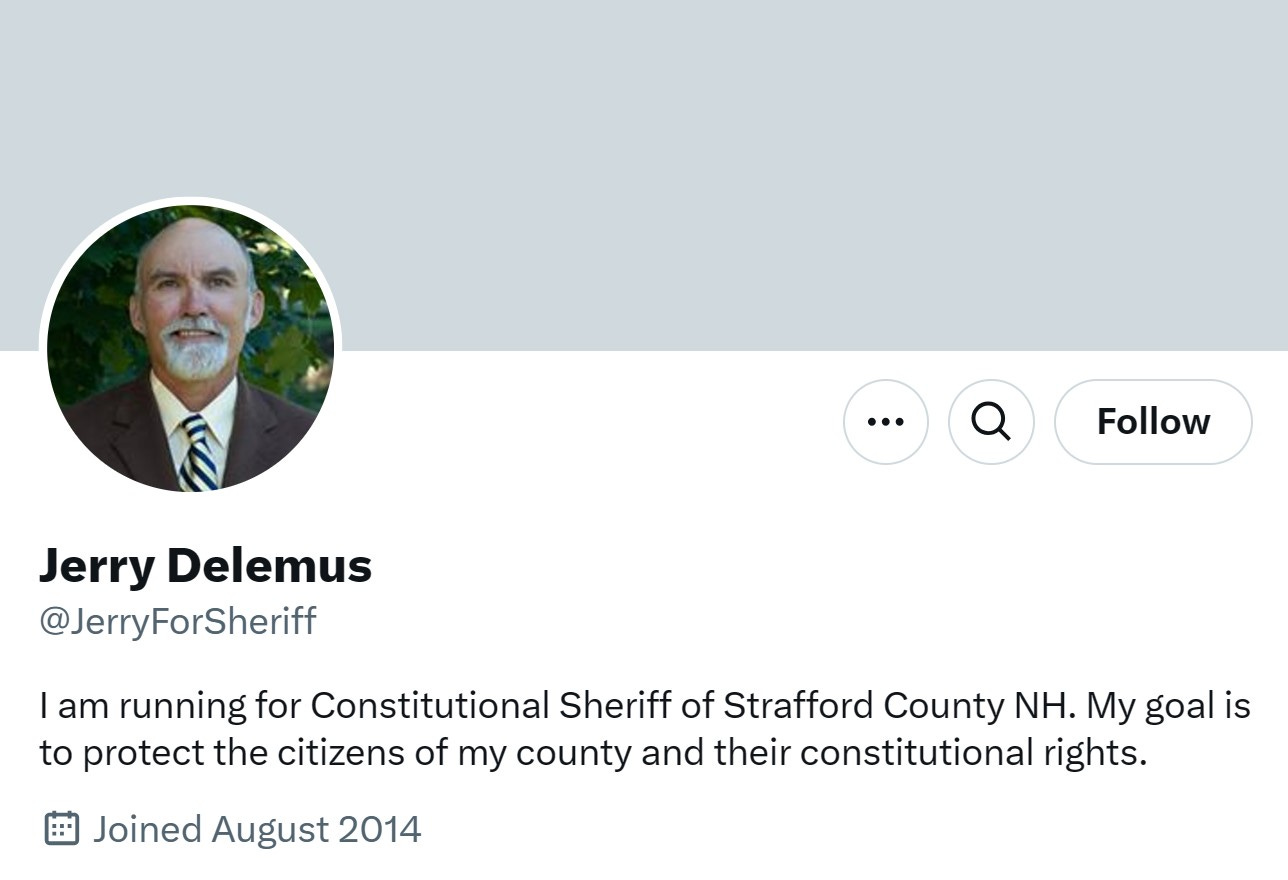There's a new 'constitutional' sheriff in town
Supporters of the GOP candidate for Strafford County, N.H. sheriff tout his membership in an anti-government extremist group at the center of the fringe constitutional sheriff movement.

The Constitutional Sheriffs and Peace Officers Association (CSPOA)—labeled an anti-government extremist group by the Anti-Defamation League—is the most prominent organization in the constitutional sheriff movement, which claims county sheriffs are the ultimate authority in their county and have the power to prevent enforcement of any law they deem unconstitutional.
Even though the Supreme Court has rejected the legal theory central to the constitutional sheriff movement, the CSPOA, led by former Arizona Sheriff Richard Mack, advises sheriffs they have the power to resist federal authority on issues ranging from border enforcement and gun control to public health measures and election security.
Strafford County, N.H. sheriff candidate Scott Tingle doesn’t use the “constitutional sheriff” catchphrase on his campaign website or in his public social media messages (and he did not respond to an email seeking comment for this story). Still, his supporters have gotten the message that he embraces the constitutional sheriff ideology.
To bolster his credentials as a constitutional sheriff, they are touting Tingle’s membership in the CSPOA, circulating a photo of a CSPOA membership card that indicates the Rochester resident joined the organization in May 2024—six months after announcing his candidacy.
“[H]aving a constitutional Sheriff is our last line of protection from any out of line federal action to violate our rights. VOTE Scott Tingle for Strafford County NH Sheriff!” Rochester Regional Republican Committee chair Carlton Cooper wrote on the committee’s Instagram page. “He will be a humble, honest, and, most importantly, constitutional Sheriff,” echoed the committee vice-chair in an endorsement displayed on Tingle’s campaign website.
Tingle, a pre-trial case manager with Strafford County Community Corrections and a deputy sheriff with the Strafford County Sheriff’s Office, signaled that he is aligned with the constitutional sheriff movement in a response to Cooper's false claim that Kamala Harris, if elected president, plans to confiscate firearms. Tingle’s reply made it clear he would not comply with such an order: “From my cold dead hands…”
White supremacist origins
The belief that the county sheriff is the nation's highest law enforcement authority, with the power to determine if laws are constitutional and to defy the federal officials who enforce them, originated with white supremacist William Potter Gale in the 1970s.
In The Terrorist Next Door, Daniel Levitas described Gale as a self-styled minister who denounced “race-mixing” as a violation of divine law. Gale believed that a “satanic Jewish conspiracy, disguised as communism, was corrupting public officials and the courts, undermining the sovereignty of America and its divinely inspired Constitution.”
“Gale hoped to lay the groundwork for a violent revolution by creating a paramilitary group known as the Posse Comitatus,” Levitas wrote. After a series of deadly encounters with law enforcement, the movement splintered, though Gale's concept of the sheriff as the nation's highest law enforcement authority lived on and the modern constitutional sheriff movement arose from the ashes.
Constitutional sheriff activity in NH
Granite Staters have had encounters with the constitutional sheriff movement. In 2011, Carroll County Sheriff Christopher Conley, identified as a CSPOA member on the CSPOA website, expressed support for sovereign citizen Charles Gregory Melick and allegedly refused to detain him for a federal warrant. Conley lost his reelection bid the next year.
That same year, Hillsborough County sheriff candidate Frank Szabo promised to serve as a constitutional sheriff and vowed to defend citizens from “rogue federal and state agencies.” He made national headlines when he said that he would consider using deadly force to stop an abortion and subsequently lost his primary challenge.
In 2014, CSPOA founder Sheriff Mack went to Nevada to support Cliven Bundy in his standoff with federal authorities. New Hampshire Tea Party activist (and Rochester resident) Jerry DeLemus was also there. When the standoff ended, DeLemus declared that he was going home to run for "Constitutional Sheriff of Strafford County." His plans were derailed when he was convicted on federal charges for his actions at the Bundy Ranch and sentenced to seven years in prison.








The article is a typical Marxist-style hit piece. You state that the Supreme Court has "rejected" the legal theory central to the constitutional sheriff movement, referencing a 1958 Supreme Court decision. Much newer clarification of this situation has been added to the body of law.
Perhaps you might read Supreme Court Justice Scalia's court Opinion in the cases 95-1478 (Printz) & 95-1502 (Mack) concluded in 1997. In that case, Scalia defined the County Sheriff as the "CLEO" - Chief Law Enforcement Officer. Scalia's Order summarized that 'The Federal Government may not compel the States to enact or administer a federal regulatory program' and that 'Congress cannot circumvent that prohibition by conscripting State's officers directly. The Federal government may neither issue directives requiring States to address particular problems nor command the State's officers or those of their political subdivisions to administer or enforce a federal regulatory program. It matters not whether policy making is involved, and no case by case weighing of the burdens or benefits is necessary; such commands are fundamentally incompatible with our constitutional system of dual sovereignty.
Finally, Scalia explains the Supremacy Clause of the Constitution as requiring the "Law Of The Land" ONLY "Laws of the United States which shall be made in Pursuance [of the Constitution]. As evidenced by the supporting information in this case, the Supremacy Clause remains intact when the Federal Government follows the laws of the land.
Examining the other arguments in this article with the same care exposes not the intent of truth and concern for the people of the United States but rather an agenda to interpose a new interpretation of Constitutional law, relegating oath-taking stewards of this law to the position of historical relic or ceremonial, and undermining the Supremacy Clause of the United States Constitution.
The author follows the pattern of CSPOA 'critics,' like the SPLC, repeating tired slogans and lies denoting a total disregard for or a lack of understanding of the US Constitutional government and the role that Sheriffs are to play.